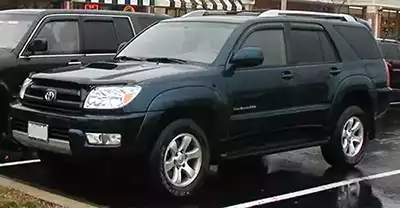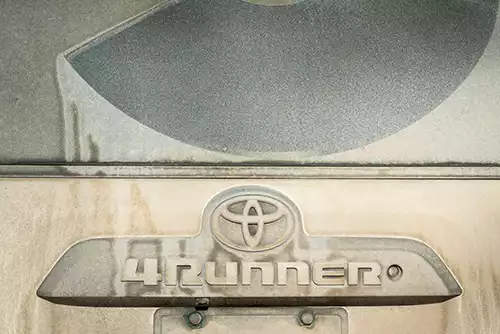Excessive Frame Rust Leads to Toyota 4Runner Dangers
The frame of a vehicle provides structure and stability, and is the very basis of the vehicle's crashworthiness. Crashworthiness refers to a vehicle's ability to withstand a collision and protect persons in the passenger compartment. The frame is designed to absorb all types of dangerous forces exerted on the vehicles, many of which originate from routine driving–forces that derive from vehicle handling, accelerating, braking, engine torque, and travel across uneven surfaces. Defective Toyota 4Runners do not perform safely under even ordinary driving conditions.
The frame also provides the structure for other components of the vehicle including the suspension, the engine, the transmission and the body. When the frame becomes compromised, as is the case of defective Toyota 4Runners, the crashworthiness degrades significantly, putting the vehicle's passengers as well as nearby motorists at risk. Defective Toyota 4Runners have been found to rust and corrode to the degree that vehicle components become detached from the frame and the driver loses control of the vehicle.

There are a number of hazards related to Toyota 4Runner defects which may be difficult to detect until it is too late. These include alignment issues and uneven wear to the tires, shocks and suspension systems. Alignment issues caused by Toyota 4Runner defects can result in stress to the suspension and compromised steering capability. When uneven tire wear results from the Toyota 4Runner defect, the vehicle's suspension system and tires will gradually degrade, compromising the driver's ability to control the vehicle and possibly leading to tire blow-outs. Suspension, frame and shock damage in defective Toyota 4Runners can result in shaking, sliding, and swerving caused by a dangerous reduction in tire traction and overall vehicle instability.
Manufacturing Problem Causes Toyota 4Runner Defects
Toyota 4Runners with dangerous defects were manufactured by Dana Holding Corp. between 2003 and 2008. During this period of time, the manufacturer failed to apply an essential anti-corrosion agent to the frame and undercarriage. Not only does this violate Toyota's marketing claims and safety commitments, but it leads to severe rust corrosion and dangerous or inoperable vehicles. The vehicles affected include Toyota4Runner model years 2005 - 2011.
Toyota claims to use the "most advanced technology available" to prevent rust and corrosion of the frame. When this technology is not utilized, as in the case of defective Toyota 4Runners, the frame is at risk for serious rust corrosion. When rust and corrosion develop on a vehicle frame, the structural integrity and therefore the basic safety of the vehicle become compromised.
The owner's manual for defective Toyota 4Runners states, "Toyota, through its diligent research, design, and use of the most advanced technology available, helps prevent corrosion and provides you with the finest quality vehicle construction."" Critics say Toyota's failure to meet these claims amounts to negligent misrepresentation and breach of warranty. Excessive rust and corrosion resulting from this mistake renders Toyota 4Runners defective, unsafe and a public safety threat.
Toyota Settlement Excludes 4Runner Defects
A Toyota 4Runner defect lawsuit has been filed by Gary Weinrich on behalf of all owners of excessively rusted Toyota 4Runners. A previous settlement in 2016 for $3.4 billion provided funds to replace rusted frames in 1.5 million Toyota trucks and SUVs, yet excluded defective Toyota 4Runners. Weinrich and other owners of defective Toyota 4Runners are calling on Toyota North America for compensation for the damages, risk and harm caused by these dangerous and defective vehicles.
Weinrich's story represents just one example of the confusion, frustration, and danger that have resulted from Toyota 4Runner defects. In 2005, Weinrich bought a new Toyota 4Runner. He took the vehicle to its routine maintenance appointments at the dealership. At one such appointment, in 2011, an employee at the Toyota service center told Weinrich his 4Runner had developed excessive rust on the undercarriage and drive shaft transmission. In 2013, again at a Toyota service center, a mechanic noted excessive rust on the undercarriage, splash shield, exhaust and shocks. Despite these problems, the service center employee assured Weinrich the vehicle was still safe to drive.
In 2017, Weinrich had the vehicle serviced at a Meineke Car Care center. Noting "excessive frame corrosion", the manager alerted Weinrich to the recent Toyota rust settlement. Wondering if his vehicle had the same manufacturing defect, Weinrich contacted Toyota. An official at Toyota told Weinrich the rust on his 4Runner was his own responsibility because 4Runners were not a part of the Toyota rust settlement.
Despite his concerns, Weinrich continued to drive the vehicle. In May of 2018, Weinrich was driving down the road in his 4Runner when a violent vibration in the vehicle caused him to lose control and veer off the road. The excessive rust that had developed on his 4Runner resulted in the right front control arm breaking off the frame which caused Weinrich to lose control of the right front wheel. No one was injured but the vehicle was deemed inoperable and irreparable.






.png)
.png)

.png)
.png)



